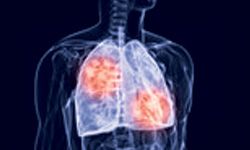Icotinib Comparable to Gefitinib for Brain Metastasis of EGFR-Mutated NSCLC
Icotinib, an EGFR tyrosine kinase inhibitor, demonstrated similar efficacy to gefitinib as a treatment of brain metastasis in patients with EGFR-mutated non–small cell lung cancer, results from a Chinese retrospective study showed.

Icotinib (Conmana), an EGFR tyrosine kinase inhibitor (TKI), demonstrated similar efficacy to gefitinib (Iressa) as a treatment of brain metastasis in patients withEGFR-mutated nonsmall cell lung cancer (NSCLC), results from a Chinese retrospective study showed.
The study included 164 patients withEGFR-mutant NSCLC and of those patients, 56 had brain metastasis. A total of 47 patients received icotinib or gefitinib, and 9 patients received erlotinib (Tarceva) or afatinib (Gilotrif). After some patients were excluded from the efficacy analysis due to the types of prior treatment or primary organ failure, 43 patients were evaluable for the efficacy analysis. Twenty of those patients were in the icotinib arm and 22 patients were in the gefitinib arm.
With icotinib, patients had a 57.1% response rate (95% CI, 34.1%-80.2%) compared with 63.7% (95% CI, 41.8%-85.5%) in the gefitinib arm, showing no significant difference in the objective response rate (ORR) or disease control rate (DCR) in either study group (P>.05). This finding was similar to what was observed in earlier large randomized clinical trials.
Both arms had comparable progression-free survival (PFS). In the icotinib arm, the median PFS was 6.5 months (95% CI, 5.7-7.3), and in the gefitinib arm, the median PFS was 7.3 months (95% CI, 6.1-8.6), which was not considered to be significantly different (P = .17).
Investigators led by Kejun Liu, MD, also evaluated the intracranial efficacy of patients withEGFR-mutant NSCLC in this study. The results showed that icotinib led to a complete response (CR) in 3 patients, a partial response (PR) in 11 patients, and stable disease (SD) in 4 patients. Treatment with gefitinib similarly achieved CRs in 3 patients, PRs in 10, and SD in 5. The ORR observed was 66.6% in the icotinib group and 59.1% in the gefitinib group (P= .62). The DCR in the icotinib and gefitinib arms, respectively, were 85.7% versus 81.8% (P = .73). These differences were not deemed significant.
The median intracranial PFS (iPFS) was 8.4 months (95% CI, 5.4-11.3) in the icotinib group and 10.6 months (95% CI, 6.3-14.8) in the gefitinib group (P = .17). The contrast between these arms was not statistically significant in this case either.
Treatment with icotinib and gefitinib may have prompted the toxicities observed in the study, which include rash, pruritus, dizziness, fever, diarrhea, fatigue, nausea, vomiting, anorexia, raised aminopherase, dyspnea, and hemorrhage. Most adverse events (AEs) in the icotinib and gefitinib groups, respectively, were grades 1 and 2, including rash (33.3% vs 40.9%), nausea (28.6% vs 31.8%), and pruritus (23.8% vs 27.3%). The difference in the emergence of grade 1/2 AEs was (P>.05), which held no statistical significance. Only 4 patients overall experienced grade 3/4 AEs, including rash (4.8%), raised aminopherase (4.8%) in the icotinib arm and rash (9.1%) in the gefitinib group. The difference in the emergence of grade 3/4 events (P>.05) was not statistically significant.
Liu et al concluded from these results that icotinib has similar efficacy for brain metastasis ofEGFR-mutated NSCLC to gefitinib. However, the investigators noted that the study was limited by a small number of patients and the lack of key subtypes for analysis. These findings warrant a comparative study of icotinib and gefitinib in a large, randomized fashion to confirm the results.
Patients in the study received 125 mg of icotinib 3 times per day or 250 mg of gefitinib once per day until disease progression or unacceptable toxicity. The primary end point of the study was iPFS and the key secondary end points were ORR and DCR.
Eligible patients would have been 18 years of age or older with a cytological or histological confirmation of stage IIIB or IV NSCLC harboring anEGFRsensitizing mutation of exon 19 del or exon 21 L858R. Patients were required to have at least 1 measurable lesion of brain metastasis per RECIST v1.0 and have been treated with icotinib or gefitinib.
Currently, icotinib is only sold and marketed in China. Gefitinib was the first EGFR-targeted therapy to be approved for the treatment of NSCLC.
Reference:
Liu K, Jiang G, Zhang A, Li Z, Jia J. Icotinib is as efficacious as gefitinib for brain metastasis of EGFR mutated non-small-cell lung cancer.BMC Cancer 2020;20(76). doi: 10.1186/s12885-020-6543-y.
Kim Evaluates New Regimens for EGFR+ Lung Cancer
January 20th 2025During a Community Case Forum event in partnership with the Medical Oncology Association of Southern California, Edward S. Kim, MD, MBA, discussed the FLAURA2 and MARIPOSA trials of newer regimens for EGFR-positive lung cancer.
Read More
Amivantamab/Lazertinib Maintains OS Benefit in EGFR+ NSCLC
January 15th 2025During a Case-Based Roundtable® event, Joshua K. Sabari, MD, continued discussion of key outcomes from the MARIPOSA trial and toxicity management in patients with EGFR-mutated non–small cell lung cancer in the second article of a 2-part series.
Read More